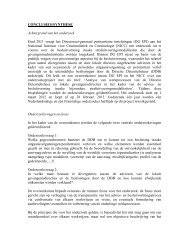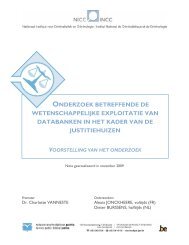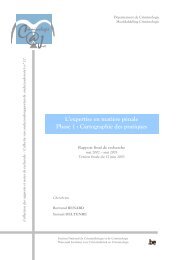Toepassingsmogelijkheden van het elektronisch toezicht in het ...
Toepassingsmogelijkheden van het elektronisch toezicht in het ...
Toepassingsmogelijkheden van het elektronisch toezicht in het ...
You also want an ePaper? Increase the reach of your titles
YUMPU automatically turns print PDFs into web optimized ePapers that Google loves.
Bail<br />
AFDELING III – ENGELAND EN WALES<br />
c. een ander goede of toereikende reden.<br />
b) dat de openbare aanklager heeft gehandeld met de gepaste snelheid (“has acted<br />
with all due expedition”). 119<br />
Wanneer iemand niet <strong>in</strong> voorlopige hechtenis wordt geplaatst, maar <strong>in</strong> vrijheid wordt<br />
gesteld met of zonder voorwaarden, wordt dit <strong>in</strong> Engeland omschreven als ‘bail’ of borg.<br />
De Bail Act verscheen <strong>in</strong> 1976. 120 Zoals dit ook <strong>in</strong> <strong>het</strong> Belgische rechtsstelsel <strong>het</strong> geval is,<br />
wordt elke persoon die er<strong>van</strong> beschuldigd wordt een misdrijf te hebben gepleegd, als<br />
onschuldig beschouwd totdat <strong>het</strong> tegendeel is bewezen. De vrijheidsberov<strong>in</strong>g (opsluit<strong>in</strong>g)<br />
mag dan ook enkel onder zeer str<strong>in</strong>gente voorwaarden gebeuren.<br />
De voornaamste reden om borg af te wijzen, bestaat <strong>in</strong> <strong>het</strong> feit dat de persoon<br />
beschuldigd wordt <strong>van</strong> een misdrijf waarop ge<strong>van</strong>genisstraf staat èn er substantiële<br />
gronden zijn om te geloven dat: de verdachte zou vluchten; verdere misdrijven zou<br />
plegen (terwijl onder borg); er gevaar bestaat voor collusie of <strong>in</strong>timidatie <strong>van</strong> getuigen;<br />
<strong>het</strong> een misdaad betreft (‘<strong>in</strong>dictable offence’, te behandelen door de Crown Court); of de<br />
rechtbank er<strong>van</strong> op de hoogte is dat de betrokkene al op borg vrij was voor een ander<br />
misdrijf op <strong>het</strong> ogenblik dat hij <strong>het</strong> nieuwe misdrijf pleegde. 121<br />
De rechter moet hierbij ook reken<strong>in</strong>g houden met: de aard en de ernst <strong>van</strong> de <strong>in</strong>breuk, <strong>het</strong><br />
karakter, de antecedenten, b<strong>in</strong>d<strong>in</strong>gen en gemeenschapsbanden <strong>van</strong> de beklaagde, de<br />
geschiedenis <strong>van</strong> de beklaagde <strong>in</strong> verband met vroegere borg, en de overtuig<strong>in</strong>gskracht<br />
<strong>van</strong> <strong>het</strong> bewijsmateriaal. 122<br />
De rechter kan borg ook weigeren:<br />
− ter bescherm<strong>in</strong>g <strong>van</strong> de beklaagde;<br />
− <strong>in</strong>dien de beklaagde al een straf uitzit voor een ander misdrijf:<br />
119 A.M. <strong>van</strong> Kalmthout, M.M. Knapen, C. Morgenstern (ed.), Pre-trial detention <strong>in</strong> the European Union,<br />
An analysis of m<strong>in</strong>imum standards <strong>in</strong> pre-trial detention and the grounds for regular review <strong>in</strong> the member<br />
states of the EU, Nijmegen, Wolf Legal Publishers, 2009, 950.<br />
120 Bail Act 1976 (c.63), te raadplegen op:<br />
http://www.opsi.gov.uk/RevisedStatutes/Acts/ukpga/1976/cukpga_19760063_en_1#pb1-l1g1<br />
121 Bail Act, Schedule I, paragraaf 2/2A: “2. The defendant need not be granted bail if the court is satisfied<br />
that there are substantial grounds for believ<strong>in</strong>g that the defendant, if released on bail (w<strong>het</strong>her subject to<br />
conditions or not) would (a) fail to surrender to custody, or (b) commit an offence while on bail, or (c)<br />
<strong>in</strong>terfere with witnesses or otherwise obstruct the course of justice, w<strong>het</strong>her <strong>in</strong> relation to himself or any<br />
other person. 2A. The defendant need not be granted bail if, (a) the offence is an <strong>in</strong>dictable offence or an<br />
offence triable either way; and (b) it appears to the court that he was on bail <strong>in</strong> crim<strong>in</strong>al proceed<strong>in</strong>gs on<br />
the date of the offence.”<br />
122 Bail Act, Schedule I, paragraaf 9: “In tak<strong>in</strong>g the decisions required by paragraph 2 [F1 or 2A] of this<br />
Part of this Schedule, the court shall have regard to such of the follow<strong>in</strong>g considerations as appear to it to<br />
be rele<strong>van</strong>t, that is to say—(a)the nature and seriousness of the offence or default (and the probable method<br />
of deal<strong>in</strong>g with the defendant for it),(b)the character, antecedents, associations and community ties of the<br />
defendant,(c)the defendant’s record as respects the fulfillment of his obligations under previous grants of<br />
bail <strong>in</strong> crim<strong>in</strong>al proceed<strong>in</strong>gs,(d)except <strong>in</strong> the case of a defendant whose case is adjourned for <strong>in</strong>quiries or a<br />
report, the strength of the evidence of his hav<strong>in</strong>g committed the offence or hav<strong>in</strong>g defaulted, as well as to<br />
any others which appear to be rele<strong>van</strong>t.”<br />
51






